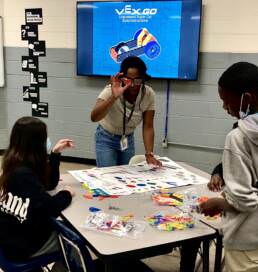Ebonie Harrell – STEAM – Sunny Hill
Students at Sunny Hill Intermediate School are building on their STEAM foundations learned at Anderson, Haywood Elementary, and East Side and moving into more complex, hands-on projects under the guidance of first-year teacher Ebonie Harrell.
Ebonie decided to transition from corporate America to the world of education because she wanted to give something back to the area where she grew up.
“Corporate America started to feel unfulfilling, so I wanted to do something that gave back and education seemed like the right fit. I grew up in Lauderdale County, so it’s been nice to come back home and give something back,” Ebonie said.
Specifically, Ebonie wanted to give something back in the area of STEAM. As a student, she was able to participate in a program that was very similar to STEAM but was only available to certain students in her school.
“When I was in grade school, I was part of the XCEL program which was essentially STEAM but every child didn’t have that opportunity,” she explained. “That’s why I was attracted to this subject area – because every child needs access to a class like this, not just a select few.”
While educational equity is a top priority in Haywood County Schools (HCS), oftentimes the core academic subjects (English, Math, Science, Social Studies) are only discussed. However, STEAM is taught in every school and at every grade level in HCS, and that is one reason why Ebonie gravitated to this subject area when she decided to make a career change.
“When I saw STEAM was offered at this level (fifth and sixth grade), I wanted to be a part of that because it’s so important to get students involved at an early age with the ideas that STEAM promotes.,” she said. “The kids can connect so much of what they learn in STEAM to their other subjects, so a class like this is essential and I very much wanted to be part of that.”
As she winds down her first semester in education, Ebonie is seeing how her students are drawn to certain aspects of STEAM.
“My students gravitate toward the technology and engineering aspects of STEAM. They love to build things and, as far as the technology goes, they’re immersed in that on a daily basis so that just carries over to the class. Sometimes they know more than I do about technology,” she said.
Because STEAM places a heavy emphasis on the hands-on aspects of project-based learning, the planning stages of a project may not get the attention they deserve. In STEAM, however, the planning is integral to the building and creation of a project. In Ebonie’s class, effective planning is vital for a current project her class is currently completing.
“Right now, we’re working on a tiny house project. We start with the blueprint process down to the geometric shapes and square footage. We’re doing all the mathematical formulas to calculate the area and then we’ll move on to the hands-on part of the process which will be to actually build it,” she explained. “After the blueprint, they’ll be able to build their model of their tiny home. We’ll continuously add to it over time.”
Because she sees each of her classes only once a week for 45 minutes, many projects have to be carried over to multiple class meetings. This allows the students to sharpen their long-term planning skills and focus on time management within a given class period.
Along with the tactile and interactive projects, students are also issued a Chrome book in order to complete projects that focus more on the technological aspects of STEAM.
“Each student is assigned a Chrome book. We do coding on the computer as well as design video games. We’ve designed stories on the computer, too,” Ebonie said.
As far as what part of the STEAM curriculum Ebonie enjoys teaching, she didn’t hesitate to answer.
“I personally enjoy teaching the engineering aspects of STEAM. I can see so much problem solving and critical thinking among the students. They are so innovative. They have no filter at this age, so their creativity is off the charts. When they design, it’s so exciting to watch because you can see their minds externalize the process. They’re the primary drivers in their learning process, not me. I love seeing that,” she said.
While she is definitely enjoying her time as a first-year STEAM teacher, Ebonie has a vision for how she wants STEAM to evolve at Sunny Hill.
“Principal Aitken and I have been talking a lot because I’d love for this class to become more of a lab setting and also introduce an agricultural aspect to this class. We’d love to see kids become more involved in the understanding of agriculture because that’s a big deal in Haywood County,” she said.
The future of STEAM is definitely bright in Haywood County.


